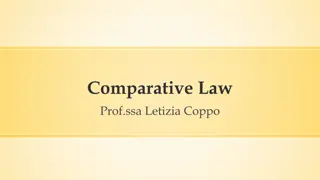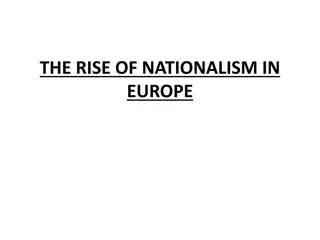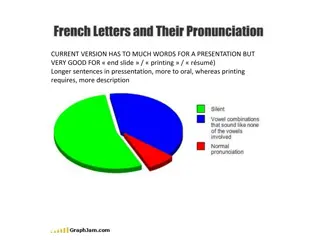
French Revolution: Causes and Impacts Unveiled
Explore the French Revolution of 1789-1799, encompassing the shift from absolute monarchy to republican ideals driven by principles of freedom, equality, and brotherhood. Uncover the economic, social, and political factors that ignited this transformative era and shaped Western democracy. Dive into the factors behind the revolution, from economic disparities to social injustices, and the eventual downfall of Emperor Louis XVI. Witness the sweeping changes that marked a shift in power dynamics and societal norms during this turbulent period in French history.
Download Presentation

Please find below an Image/Link to download the presentation.
The content on the website is provided AS IS for your information and personal use only. It may not be sold, licensed, or shared on other websites without obtaining consent from the author. If you encounter any issues during the download, it is possible that the publisher has removed the file from their server.
You are allowed to download the files provided on this website for personal or commercial use, subject to the condition that they are used lawfully. All files are the property of their respective owners.
The content on the website is provided AS IS for your information and personal use only. It may not be sold, licensed, or shared on other websites without obtaining consent from the author.
E N D
Presentation Transcript
FRENCH REVOLUTION SEM V CC-XI MOUSUMI ROYCHOUDHURY
French Revolution French Revolution (French: R volution fran aise) (179 1799) During this revolution, the abolition of the absolute monarchy in France and the advance of the republican ideology began. At the same time the Roman Catholic Church in the country was forced to abandon all orthodoxy and reorganize itself.
The principle of the French Revolution was "Libert , algalit , fraternit , ou la mort!" Meaning "freedom, equality, brotherhood, or death". It was this slogan that became the driving force of the revolution through which democracy was established in the Western world by following both military and non-violent methods. This slogan then became the lifeblood of all the workers.
Causes Economic Reasons Poor economic conditions and unbridled national debt. The main reasons for this were unequal taxation which was not burdensome at all, the excessive cost of Emperor Louis VIII and the various wars of the eighteenth century. : High unemployment rates and high food prices. The food crisis that existed in the months just before the revolution.
On the other hand, there were some social and political reasons behind it. Society started its movement centered on these factors and was influenced by the Age of Enlightenment. These reasons are:
1) Restoration of absolute monarchy which was detrimental to the monarchy. 2) Extensive benefits were being given to a special professional class of society and upper class people who began to influence the life of the people. 3) Lots of women are abused
4) The movement for the overthrow of the zamindar system was started by the peasants, the working class and to some extent the bourgeoisie. 5) Inequality of opportunity between different classes of employees, the enjoyment of priesthood becomes extreme. On the other hand, there is a tide in favor of religious freedom. 6) Last but not least, the final failure of Emperor Louis XVI to solve any of these problems.
Royal financial crisis The Revolutionary Crisis began when Emperor Louis XVI of France (reigned 174 - 1792) faced a financial crisis. The French monarchy was heavily indebted, which led to the financial crisis.
Royal financial crisis During the reigns of Louis XVI (reign: 1815-184) and Louis XVI, the decision of the concerned ministers of finance was taken to manage the royal finances. Among the ministers are Baron, Jacques Turgot (Director General of Finance: 184-18) and Jacques Necker (Director General of Finance: 17-181). They have repeatedly suggested that the French tax system be scrapped to solve the problem, which has not met with much success.






















